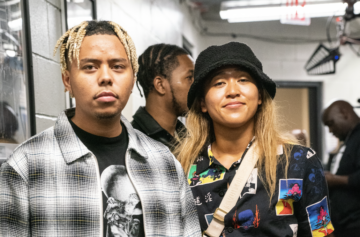By Jala Norman | TSL Contributor
With the Tokyo Olympics looming, there is one superstar athlete that won’t be representing Team USA.
Her name is Naomi Osaka.
No, she is not opting out of the Olympics. She will definitely be participating, but not as an American citizen. Instead, she will be representing Japan.
In the past week, the richest athlete of 2021 released a Barbie Doll series and also announced a new Netflix film on her incredible life.
@naomiosaka Has New Barbie Doll Line https://t.co/sSkSyNnDyd via @The Shadow League
She’s still killing the game on and off the court. America and Japan’s sweetheart pic.twitter.com/j0Z1ZgfeWx
— The Shadow League (@ShadowLeague) July 13, 2021
The 22-year-old tennis star was born in Osaka, Japan to a Japanese mother and a Hatian father.
Her family immigrated to the United States when she was just 3-years-old. After learning that she’d have to relinquish her American citizenship if she wanted to represent Japan, Osaka took the necessary steps to relinquish her dual citizenship status in the United States.
Now, she is ready to represent her birth country for the Olympics.
Unfortunately, it is a decision that has had her critics enraged.
In her new docuseries, Osaka exposes her private self more than she’s ever done and unpacks the scrutiny behind her decision.

“I’ve been playing under that Japanese flag since I was 14,” says Osaka. “So, it was never even a secret that I’m going to play for Japan for the Olympics. So I don’t choose America, and suddenly people are like, ‘Your black card has been revoked.’”
While tennis is a predominantly white sport in the United States, black women have been monumental in progressing the sport in the United States. For years Venus and Serena Williams carried the success of the sport on their back.
Venus And Serena Williams. Forever Linked By Blood And Sport
Now, young talents like Osaka and Coco Gauff are the newest black women to become the face of the sport.
Nevertheless Osaka represents something that the other three don’t. While she is black, she isn’t African American, which means that in her success, Americans are forced to grapple with what it looks like to be black, while not being African American.
According to Osaka’s words in her docuseries, the concept can be difficult for Americans to grasp.
“African American isn’t the only black. I feel like people really don’t know the difference between nationality and race because there’s a lot of black people in Brazil, but they’re Brazilian.”
She’s not wrong. But for many, it still feels wrong. When the idea of the American Dream is so popular, it can often take Americans by surprise when someone does not always choose the United States as the superior choice.
If people loved Asian people as much as they love bubble tea, anime, mochi, sushi, matcha etc… Imagine profiting/enjoying things that come from a culture and then attacking/diminishing the ethnic group that created it.
— NaomiOsaka大坂なおみ (@naomiosaka) March 27, 2021
Nevertheless, Osaka embracing who she is as a Japanese woman does not take away from her being black.
Her acknowledging that she is not African American also does not take away from her being black. Matter of fact, she has never dismissed being black in America. Instead, she has publicly embraced it.
Over the past year, after the murder of George Floyd, Osaka used tennis as a way to voice her opinions on racial inequalities and police brutality.
Naomi Osaka is wearing a Breonna Taylor mask before her match at the #USOpen pic.twitter.com/jtds1g88C5
— ESPN (@espn) September 1, 2020
The world watched as she wore seven different Black Lives Matter masks during the 2020 U.S. Open.
Each mask included the names of black men and women who had been killed due to racial injustice.
According to Osaka, she wanted to get more people talking. The girl who many saw as the soft-spoken athlete, now wanted to start some conversations, and she wanted to do it in the name of racial equality.
To say that Osaka is soft-spoken isn’t a stretch at all. Matter of fact, she did not compete in this year’s French Open or Wimbledon tournaments after stating that she has anxiety before talking to the news media.
She finally decided that the best decision was to take some time away from tennis until the Tokyo Olympics.
So now here we are, only a few days away from seeing Osaka on a tennis court once again. This time, she will be on a quest to add Olympic Champion to her resume.
Despite her playing under the Japanese flag before, this will be the first time that many Americans see her participating as a Japanese citizen.
Japanese Advertisers Remove Naomi Osaka's Blackness From Ad – The Shadow League : The Shadow League https://t.co/T3AhnzN9bj
— Prison for the Traitor Trump! 🇺🇸 (@schotdoktor) January 27, 2019
But perhaps it should be stated that this will be the perfect time for many of us to acknowledge just how versatile Osaka really is.
Yes she is Japanese, but she is also Haitian. She is biracial, but proudly acknowledges who she is as a back woman and an Asian woman.
She is Japanese-born and American-raised, and despite not being African American, her fight for racial equality reaches far beyond her ethnic background.



